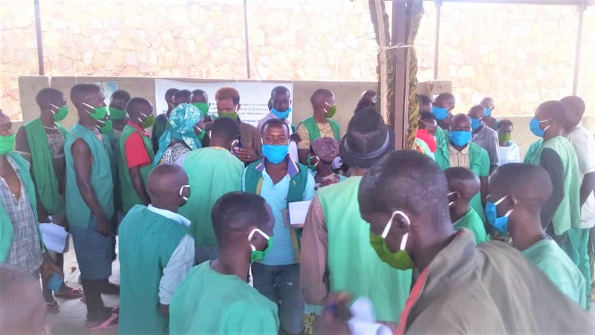
On January 15, 2021, Burundi Bridges to Justice (BBJ) conducted rights awareness events in Mpimba and Rumonge prisons in Burundi. A total of 350 pre-trial detainees attended the events, including 49 women.
The pressing need for rights awareness in the prisons of Burundi
By IBJ Country Manager Jean-Claude Barakamfitiye
On January 15, 2021, Burundi Bridges to Justice (BBJ) conducted rights awareness events in Mpimba and Rumonge prisons in Burundi. A total of 350 pre-trial detainees attended the events, including 49 women.
Because of COVID-19, only two members of the BBJ team were allowed to enter the prisons. We obeyed strict health security protocols, including wearing masks, washing our hands at prison entrances, and using disinfectants to ensure that we protected ourselves and the detainees.

Once inside each prison, we were welcomed by hundreds of detainees. One joked, saying: “Let’s leave them inside so they can see for themselves how bad prison conditions really are, and the way we are forced to live.” These words touched me greatly and made me tear up because it was no joke – it was the harsh reality of their circumstances. When we arrived at the small prison chapel in Rumonge prison where we had planned to conduct the rights awareness campaign, we found it packed with more than 150 detainees already seated – this was far more than what we had anticipated. The detainees all seemed as hopeless as sheep without a shepherd. The sheer number who had shown up was proof in of itself of the desperate need for rights awareness for pre-trial detainees.
The BBJ events focused on the basic rights of every accused person, including the constitutional right to be provided with legal representation. We explained how each detainee can be provided with a lawyer even if he or she is unable to afford legal fees. We discussed due process rights of detainees during the pre-trial detention stage, including the detainee’s right to appear before a judge within 15 days from the day of arrest and a required review of detention status every 30 days if the case has not yet gone to court for trial. We emphasized the principle of the presumption of innocence and its implications for a fair trial. We also informed detainees about their right to be protected from torture and other cruel treatment, including sexual abuse. As the majority of event attendees were pre-trial detainees, it was important that we explain trial procedures and the role of different actors involved in a criminal trial. We differentiated between the role of the prosecutor and that of the judge, and explained the order that legal arguments are presented in court. We advised detainees on how to formulate closing statements and coached them on good behaviors to adopt when before the judge, whether one pleads guilty or not.
Each event ended with questions and concerns from the detainees, and there were many. One woman shared that while being interviewed by the prosecutor she was asked if she wanted to be assisted by a lawyer. When she replied “yes”, the prosecutor stopped the investigation and provided no further information or a date when she would be provided with legal representation. Accordingly, she felt is would have been easier to respond “no” because at least then her case would have progressed. This example shows how inadequate explanation by the prosecutor can have significant bearing on the normal progression of a case; the prosecutor should have clearly explained to the detained woman how she could be provided with legal representation at no cost. We received many other questions from the detainees concerning particular irregularities that were hampering their cases. For example, five Ethiopians were arrested in December but their case could not progress because of the lack of an interpreter.
At the end of each rights awareness event, we handed out BBJ flyers to attendees; in total, 270 flyers were distributed. We also conducted a number of one-on-one sessions with detainees who presented critical and time sensitive needs for legal assistance. BBJ committed to following up on cases with irregularities. As for the detained Ethiopians, we plan to connect them to a relevant multilateral organization, such as the African Union, in order to obtain an Amharic interpreter.
These BBJ events convinced us once again of the pressing need for rights awareness among detainees. We belief that it would be very useful for us to develop a basic detainee rights guide for distribution to every pre-trial detainee. Posters with basic detainee legal rights displayed at each prison would be another valuable and efficient way to increase rights awareness among detainees.
We may have our work cut out for us at BBJ but we are up to the challenge!